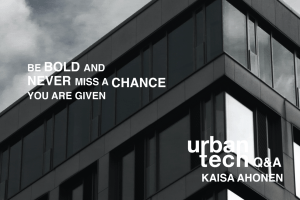Previously Christian co-founded and served as chairman for SYNERGI. Christian focuses on developing new business opportunities to enrich people’s lives in the built environment.
Urbantech: Tell us about the objectives of your work.

Christian: The idea is to transform the real estate industry to make it more customer-centric, efficient, and sustainable by combining people, capital, and ideas. NREP has since its inception created a number of platforms based on structured tailwinds and developed products that meet customer demands, rather than following the conventional route of buying up real estate, holding it, and getting the returns. As the future of the urban environment will be disrupted by technology and need to be more sustainable, NREP is sponsoring a new platform, 2150, to invest into emerging sustainable technology companies.
In 2150, we invest in technology companies in the urban stack and we bring together industry participants and investors from the urban environment, who are experts in the problem and the startups solving the problems. Our team consists of seasoned investment profiles, who have a background in investing and scaling tech companies, and facilitators with experience in sustainability and digital transformation in industrial B2B.
Urbantech: What changes do you see happening in the industry?
Christian: To date, the built environment has been a laggard with little focus on digitalisation, productivity, and sustainability. The urban environment represents 70% of all CO2 and buildings account for 90% of where we spend our time, 13% of our GDP, and have a huge labour force, so there are so many knock-on effects of investing in the ‘urban tech stack’ on society.
We see more companies during COVID-19 applying technology to solve their problems and for the first time, a strong push both regulatory and commercially to choose sustainable solutions.
With the number of assets and cities in Europe and what is needed in the rest of the world, then we need to be committed to this vision and focus on sustainability as a key driver.
Urbantech: What do you see as the key investment opportunities in the urban tech space?
Christian: In my opinion, concrete, smart real estate tech, Environmental Social and Governance (ESG) analytics, carbon capture, and storage (CSS) are amongst some of the most exciting areas. Concrete is a significant polluter that many do not know – it accounts for 8% of all CO2 – the single largest category. Within smart real estate tech, there’s a structural tailwind for solutions focused on retrofitting and energy efficiency. Then there’s a huge challenge with people being able to calculate CO2 footprints and finding software to do this. Right now it’s based on consultancy models that aren’t really scalable – we need more deep tech solutions.
As a rule, the construction sector needs a productivity overhaul. An analysis conducted by McKinsey, predicts that if the sector had the same level of productivity as other sectors in the US it would have been adding 1.6 trillion US dollars in GDP per year since the mid-1950s.
Urbantech: What would you like to see more – or less of – in the discussion on cities in the future?
Christian: I’d like to see more corporations leaning in with capital to transform the sector. Many large companies are investing time, i.e sweat equity, but it’s fundamental that they really commit with capital to support that an upcoming company can also get to the next stage. We also need better conditions for entrepreneurs in Europe. There’s a huge amount of talented entrepreneurs who could create a massive impact with the right support and I look forward to seeing how the New Green Deal will roll-out.
Lastly, so far we’ve only been talking about Unicorns which is only about economic value, but we should now be talking about developing venture capital 2.0 focused on how we solve true and really big problems, i.e. climate change and sustainability. Therefore, 2150 is hunting for what we call ‘Gigacorns’ – companies that can reduce CO2 by a gigaton.
Urbantech: How do we move the needle of multi-stakeholder collaboration?
Christian: Different facilitation is needed at different levels. To take us to the next step, I think we need more later-stage facilitation than early-stage innovation. There’s a difference between innovation and facilitation. When you need to scale something fast, the key component is facilitation. The innovation side of things is more about inspiring people and staying creative together. Those activities will always happen – I’m not so afraid of that being killed.
So venture capital has a unique role to play in taking this to the next level and solve our problems in the urban stack In Europe, we’ve had state-backed venture capital for many years. Now we’re starting to see the first set of entrepreneurs from Spotify, Klarna, and Supercell investing money back into the ecosystem. If you look back over the past 10 years, venture capital has been the best facilitator of changing habits in the world. Once we’ve found the solution to a problem, the key is to scale it – finding exponential technologies. And when we look at climate change, our biggest problem is time.
___________________
Connect with Christian on LinkedIn
Interview by Freya Williams




